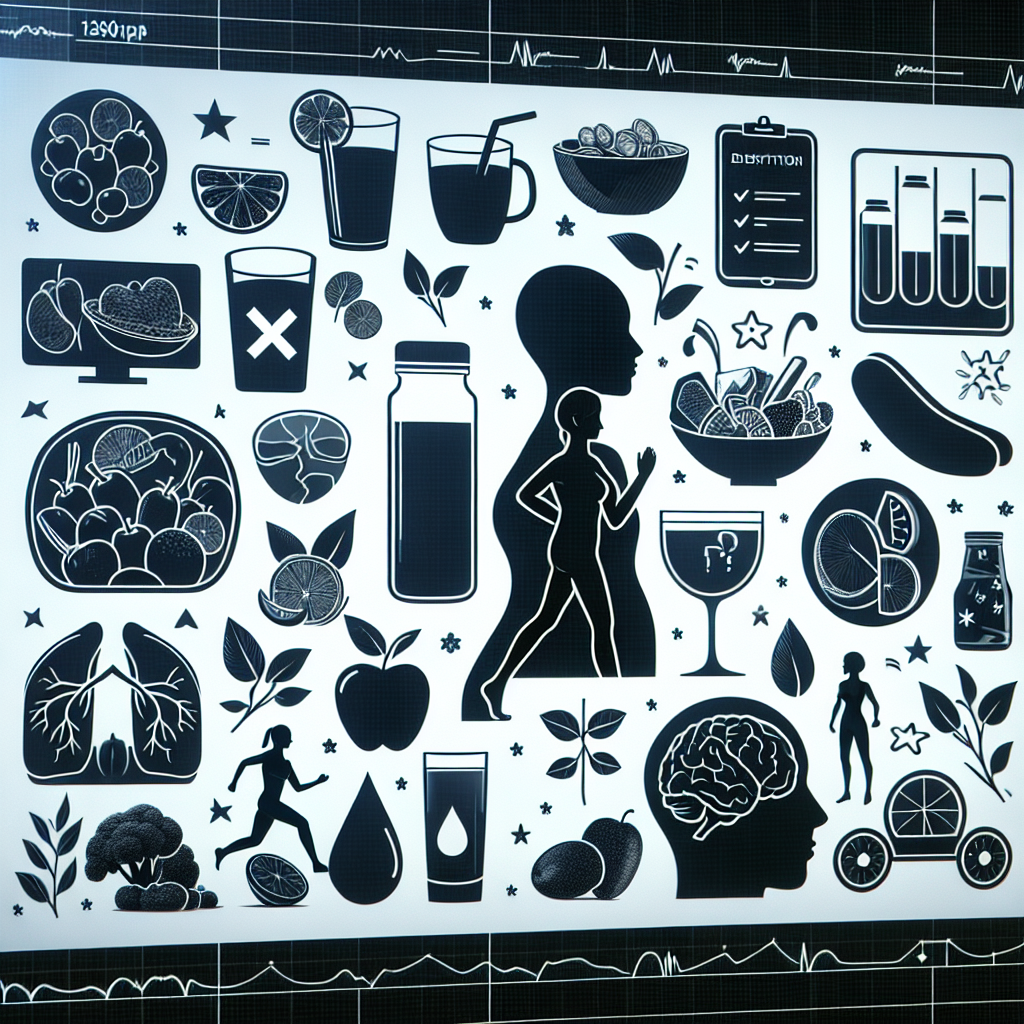Daily Habits That Support Detox

Start incorporating daily habits that support detox into your routine today! Visit My Vibrant Vitality to learn more.
Incorporating Detoxifying Foods into Your Daily Diet
Detoxification is a natural process that our bodies undertake to eliminate toxins and harmful substances. However, in today’s world, our bodies are exposed to an unprecedented amount of pollutants, chemicals, and toxins, which can overwhelm our natural detoxification system. This is where the importance of incorporating detoxifying foods into our daily diet comes into play.
The first step towards supporting your body’s detoxification process is to consume a diet rich in fruits and vegetables. These foods are packed with antioxidants, vitamins, and minerals that help to neutralize harmful free radicals and support liver function, the body’s primary detox organ. For instance, cruciferous vegetables such as broccoli, cauliflower, and Brussels sprouts contain compounds that aid in liver detoxification. Similarly, berries, citrus fruits, and other vitamin C-rich foods help to boost the immune system and enhance the body’s ability to detoxify.
In addition to fruits and vegetables, it’s also beneficial to incorporate foods rich in fiber into your daily diet. Fiber aids in digestion and helps to regulate bowel movements, both of which are crucial for the elimination of toxins from the body. Whole grains, legumes, nuts, and seeds are excellent sources of fiber.
Moreover, hydration plays a vital role in detoxification. Water aids in digestion, nutrient absorption, circulation, and the elimination of waste products. Therefore, it’s essential to drink plenty of water throughout the day. You can also enhance your water’s detoxifying properties by adding slices of lemon, cucumber, or fresh herbs like mint.
Another important aspect of a detox-supporting diet is the inclusion of healthy fats. Foods rich in omega-3 fatty acids, such as fatty fish, flaxseeds, and walnuts, help to reduce inflammation in the body, which can otherwise hinder the detoxification process.
Probiotic-rich foods like yogurt, kefir, and fermented vegetables also play a significant role in supporting detox. These foods help to maintain a healthy gut microbiome, which is essential for digestion and the elimination of toxins.
While incorporating these detoxifying foods into your daily diet, it’s equally important to limit the intake of processed foods, refined sugars, and alcohol. These substances can overload the liver and impede the body’s natural detoxification process.
Incorporating detoxifying foods into your daily diet is not about following a restrictive diet or a short-term detox cleanse. Instead, it’s about making long-term dietary changes that support your body’s natural detoxification process.
Remember, everyone’s body is different, and what works for one person may not work for another. Therefore, it’s essential to listen to your body and adjust your diet accordingly. If you’re unsure about what foods to include in your diet or how to make these dietary changes, consider seeking advice from a registered dietitian or a healthcare professional.
In conclusion, supporting your body’s detoxification process is not a one-time event but a daily practice. By incorporating detoxifying foods into your daily diet, you can enhance your body’s natural ability to detoxify, leading to improved health and well-being. So, start today, make these small dietary changes, and help your body to function at its best.
The Role of Hydration in Daily Detoxification

Detoxification is a natural process that our bodies undertake daily to eliminate toxins and waste products. This process is crucial for maintaining optimal health and preventing disease. One of the most effective ways to support daily detoxification is through hydration. Hydration plays a pivotal role in the detoxification process, and incorporating it into our daily habits can significantly enhance our overall health and wellbeing.
Water is the primary vehicle for detoxification in our bodies. It aids in flushing out toxins and waste products from our cells, tissues, and organs. When we are adequately hydrated, our bodies can efficiently carry out these detoxification processes. Conversely, when we are dehydrated, these processes can become impaired, leading to a buildup of toxins in our bodies. This buildup can contribute to a variety of health problems, including fatigue, headaches, skin problems, and even chronic diseases.
Drinking plenty of water throughout the day is one of the simplest and most effective ways to stay hydrated and support daily detoxification. The amount of water needed can vary depending on factors such as age, sex, weight, and physical activity level. However, a general guideline is to aim for at least eight 8-ounce glasses of water per day. This can help ensure that our bodies have enough water to carry out essential detoxification processes.
In addition to drinking water, we can also support hydration and detoxification through our diet. Consuming foods with high water content, such as fruits and vegetables, can contribute to our daily water intake. These foods also provide essential nutrients that support detoxification processes. For example, fruits and vegetables are rich in antioxidants, which help protect our cells from damage by toxins. They also contain fiber, which aids in the elimination of toxins through the digestive system.
Moreover, certain beverages can also support hydration and detoxification. Herbal teas, for example, not only contribute to our daily water intake but also provide beneficial compounds that support detoxification. Green tea, in particular, is rich in antioxidants and has been shown to support liver function, a key organ in detoxification. Similarly, lemon water can be a refreshing and detoxifying beverage. Lemon is high in vitamin C, an antioxidant that enhances our body’s detoxification processes.
However, while hydration is crucial for detoxification, it’s also important to note that not all beverages support this process. Drinks high in sugar, such as sodas and some fruit juices, can actually impede detoxification. They can lead to inflammation and a buildup of toxins in the body. Therefore, it’s best to limit these types of beverages and focus on drinking water and other hydrating, nutrient-rich drinks.
In conclusion, hydration plays a vital role in daily detoxification. By drinking plenty of water, consuming a diet rich in fruits and vegetables, and choosing hydrating beverages that support detoxification, we can enhance our body’s natural detoxification processes. This can lead to improved health and wellbeing, and help prevent disease. So, let’s make hydration a daily habit and support our bodies in their essential work of detoxification.
Exercise and Its Impact on Daily Body Detox
Daily habits play a significant role in maintaining our overall health and well-being. Among these habits, regular exercise stands out as a powerful tool that supports daily body detoxification. This article will delve into the impact of exercise on daily body detox and how it can be incorporated into our routine for optimal health benefits.
Exercise is a natural way to cleanse the body. When we engage in physical activity, our body increases blood circulation and perspiration, both of which aid in the detoxification process. The enhanced blood flow helps to transport oxygen and nutrients to the cells more efficiently, while also carrying away waste products. On the other hand, perspiration allows the body to expel toxins through the skin, reducing the load on the liver and kidneys, which are the primary detox organs.
Moreover, exercise stimulates the lymphatic system, a crucial part of the body’s immune system that helps to remove toxins. Unlike the circulatory system, which has the heart to pump blood around the body, the lymphatic system relies on movement to function effectively. Therefore, regular exercise can help to keep the lymph fluid moving, thereby facilitating the removal of toxins and waste from the body.
In addition to these physiological benefits, exercise also contributes to detoxification on a mental level. Regular physical activity has been shown to reduce stress levels, which is beneficial for overall health and well-being. High stress levels can lead to an accumulation of toxins in the body, as it triggers the release of certain hormones that can cause inflammation and other harmful effects. By helping to manage stress, exercise can indirectly support the detoxification process.
To reap these detox benefits, it is important to incorporate regular exercise into our daily routine. This does not necessarily mean spending hours at the gym. Even simple activities like walking, cycling, or doing household chores can increase blood circulation and stimulate perspiration. The key is to choose activities that are enjoyable and sustainable in the long term.
Furthermore, it is essential to listen to our body and not overdo it. Over-exercising can lead to fatigue and other health issues, which can counteract the detox benefits. A balanced approach to exercise, combining moderate-intensity activities with adequate rest and recovery, is the most effective way to support daily body detox.
Hydration is another crucial aspect to consider when exercising for detox. Drinking plenty of water helps to replenish the fluids lost through perspiration and aids in the elimination of toxins. It is recommended to drink water before, during, and after exercise to stay properly hydrated.
In conclusion, regular exercise is a powerful daily habit that supports body detoxification. By enhancing blood circulation, stimulating perspiration, and activating the lymphatic system, it helps to remove toxins and waste from the body. Moreover, by reducing stress levels, it contributes to detoxification on a mental level. Incorporating regular, enjoyable physical activity into our routine, combined with proper hydration, can significantly enhance our body’s natural detox processes. Therefore, for those seeking to improve their health and well-being, making exercise a daily habit is a step in the right direction.